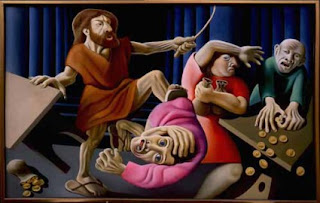Jesus and the man with Leprosy: the Great Exchange
 Over the
past few Sundays in Mark’s gospel, we have heard about various miracles and
healing in the context of Jesus’ ministry. On the one hand, these
miracles represent the reality of God’s kingdom being established in the authority
and the person of Jesus Christ. On the other hand, the miracles and healing administered by Jesus reveal to
us the temperament of God. And today’s gospel reveals to us God’s self-sacrificing
nature in healing the man with leprosy.
Over the
past few Sundays in Mark’s gospel, we have heard about various miracles and
healing in the context of Jesus’ ministry. On the one hand, these
miracles represent the reality of God’s kingdom being established in the authority
and the person of Jesus Christ. On the other hand, the miracles and healing administered by Jesus reveal to
us the temperament of God. And today’s gospel reveals to us God’s self-sacrificing
nature in healing the man with leprosy.
Before we can understand the importance of Jesus’
healing, we need to understand how people suffered beyond their physical
condition when diagnosed with leprosy. The Israelites thought that
leprosy was a punishment from God for some type of sin that one may have
committed. Strict legalism of the law of Moses was enforced, and the person
with leprosy was removed and isolated from the community. The sentencing for this
man’s infirmity was executed swiftly and, was unusually cruel.
No one was allowed, including family and friends, to
visit the leper, otherwise, they risked becoming unclean both physically and
spiritually.
When
people approached him, or likewise, he would have to yell to them that he was
unclean.
His life
ceased to exist.
In a certain sense, this
man’s life became the literal translation of “sin”; sin meaning a complete separation from God. Therefore, if a person was lucky enough to be cured
from their infirmity, it was considered by the Israelite people to be on the same
level as raising a person from the dead.
As we heard in today’s gospel, Jesus does
heal this man with leprosy. Jesus heals his physical condition which, in turn,
restored him to his community, to his loved ones, to his work, and to worship. This man literally gets his
life back.
In the bigger picture, the God in Jesus takes this
man’s place in his uncleanness, in his sufferings and in his sins. In a unique way Jesus
exchanges place with this man so that he could live again. In this great exchange, it
clearly shows something different about God that was not previously understood
by God's chosen people.
Jesus
reveals that God is not interested punishing humanity for their sins. Rather, God takes on our
exile, our desperation and our imperfections so that we can fully live. Proof of the latter is when
Jesus touches the unclean man. Christ takes on what this man feared the most: a
lonely existence; the finality of death because of sin; and being left without
the opportunity to really live in freedom.
The
disclaimer is that God gives us the freedom to make a choice to ask for
forgiveness and mercy. If we do ask Jesus for help, it is evident that God
will do the heavy lifting. Jesus will take our place, even our iniquities, in
order to bring us back into his sheepfold, not away from it.
As a result, we have much to be thankful
for. Our God who in infinite
wisdom, mercy and sacrifice has won for us inclusion within the body of Christ
no matter our faults, illnesses, or sins. Amen.
By Rev. Billy Isenor
Last Sunday in Epiphany



Comments
Post a Comment